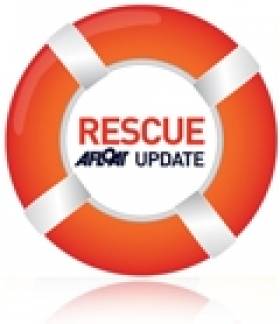Displaying items by tag: Sea Change
Sea Change Research Providing Vital Marine Knowledge
#SeaChange - The Marine Institute yesterday (Thursday 30 June) hosted a number of research projects highlighting important achievements made by the Government's investment in the Sea Change strategy to build capacity, support innovation and ensure the quality of our marine environment.
"Funded research across all areas, from fisheries and aquaculture to marine environment and seafood health, demonstrates the government's commitment to developing Ireland's blue economy while also valuing the quality of our marine environment," said Ciarán Kelly, R&D manager at the Marine Institute, at the Sea Change Researchers Workshop to coincide with SeaFest 2016 and the Our Ocean Wealth Conference.
"This Sea Change research provides vital keys to unlocking our blue economy potential, while ensuring the quality and sustainability of the marine environment."
Over the last six years there has been an investment of more than €60 million in research supported by the framework strategy A Marine Knowledge: Research and Innovation Strategy 2007-2013.
This investment has funded hundreds of projects, study programmes and research scholarships for the marine sector.
Among the projects presented at the Marine Institute yesterday were an ecosystem approach to the management of fishery resources and the detection and testing of shellfish for toxicity azasparicids.
Research on ocean acidification and the genetics of wild salmon populations represent important research funded though the Sea Change programme.
A visual display of Sea Change projects showcased the variety and scale of projects funded, and a number of the Sea Change projects were recognised by the Beaufort Marine Awards held yesterday evening.
"The Sea Change research strategy also outlined the importance of developing skills and research capacity in the marine sector, and to this end, a number of research doctorates, scholarships and education programmes were also funded," said Dr Kelly.
Investment has significantly improved marine research capacity in Ireland, according to the co-ordinators of the Sea Change programme, who say it has strengthened Ireland's competitiveness in marine research and innovation and has supported the sustainability of the marine sector by developing greater alignment between the needs of industry and the research capacity of the public sector and third level.
A new National Marine Research and Innovation Strategy is being developed which will map the current state of research and innovation underpinning Ireland's blue growth potential.
This new strategy, to be published later in 2016, will identify the maturity and capacity of research areas and will be an aid to help focus future investment.
#safetyatsea – Last Thursday (April 16) the Department of Transport published its Maritime Safety Strategy, resulting from the "Sea Change" consultation last year. By chance this coincided exactly with our publication of the ICC's independent analysis of the Marine Casualty Investigation Board reports which form the background to the programme. Norman Kean has now reviewed the latest proposals.
The new Maritime Safety Strategy contains much sensible encouragement, and also 33 proposals for action by the Irish Maritime Administration, under five headings. These include:
• "Intensification of efforts to promote maritime safety awareness through a process of information and communication, and the promotion of more effective communication between key stakeholders"
• "An appropriate regulatory regime for the seaworthiness of vessels and craft and the competency of operators and/or crew"
• "Building on the current enforcement regime."
What does this mean for leisure sailors? Under the Information and Communication heading are some sensible proposals, such as widening the membership of the Marine Safety Working Group, organising an annual maritime safety conference to be open to the public, and addressing children and young people through the education system. This goes some way to recognizing the fact that the people most at risk are not connected to the established organization of sailing clubs and training systems. Lack of awareness is the biggest killer of all.
"Appropriate regulatory regime" translates into the intent to update the Code of Practice for Safe Operation of Recreational Craft, starting in 2016. It is to be hoped that this will be done in a proportionate and well-informed manner, and that the word "should" in respect of things like carriage of equipment does not too often morph into "must". Perish the thought that we might be required by law to submit our boats to annual Government inspection, that we should be compelled on pain of prosecution to report every single arrival and departure to Coast Guards or Harbourmasters, that we might be forced to transmit AIS signals all the time on pain of a fine. All those and many more have been suggested in submissions at the consultation stage of this process. This must not be the thin end of the wedge. Transmitting AIS is undoubtedly a good idea in busy waters, but the accident statistics don't support making it compulsory. We do not need, and we certainly do not want, a Big Brother regime, and the absence of any explicit proposals in that direction is to be welcomed.
Starting in 2017, jet skis and many small speedboats will have to be registered, as defined in the new Registration of Ships Bill, and it appears that the timeline for a new voluntary small craft register will start in 2018. This is far too late. The lack of such a facility for the next three years will leave many owners with no choice but to flag out to other EU states, to avoid facing voyage restrictions and having Irish yachts, at present abroad, put at risk of being impounded for lack of ship's papers.
But it begs the question, what does all that have to do with safety? Might the mention of registration here be a step in the direction of inspection - and ultimately taxation?
A new focus is proposed on more rigorous enforcement of existing legal requirements, with extension of on-the-spot fines for breaches of lifejacket laws quoted. That particular example is common sense and should be applauded by all responsible sailors. The great majority of recreational craft fatalities occur in small open boats and the majority of casualties are not wearing lifejackets when they should be. Conspicuous enforcement would get the attention of those most at risk. Last summer we came across a speedboat grossly overloaded with eleven people aboard; none of the five adults was wearing a lifejacket. If the skipper had been met on the pontoon by a couple of burly Guards who promptly relieved him of several hundred euro, the word might get round and the message might get through. But there must be no mission creep. I was once, at the helm, accosted by a Coast Guard crew who asked me, none too gently, where my lifejacket was, to which I replied that it was safely in its locker, that this vessel was 16 metres in length and perhaps they would care to read their own rules.
Under "Data and Evaluation" it is proposed to commission a baseline study of attitudes to maritime safety. The sailing clubs of Ireland need to be proactive in taking part in that. In respect of cruising sailors, the RNLI is currently doing exactly the same thing, and we must hope that the Maritime Administration takes the results of that study fully into account. Despite the rising trend in callouts to recreational craft, the RNLI continues to be firmly in favour of education over compulsion.
#WaterSafety - The Government's 'Sea Change' consultation contained sobering statistics on boating fatalities in Irish waters, prompting calls for much tighter water safety regulation. But as Irish Cruising Club spokesman and Sailing Directions Editor Norman Kean writes, that view is not shared by all in the marine sector...
In June 2014, the Department of Transport issued a consultation document titled 'Sea Change', in which it was alleged that over an 11-year period, 66 fatalities had occurred on recreational craft. This represents 47% of all marine fatalities in the period, and the figure was widely and sometimes sensationally reported.
In light of that, it's worth examining the following extracts from the Irish Cruising Club's (ICC) submission to the department, which reflects an independent study of the original Marine Casualty Investigation Board (MCIB) reports:
The MCIB reports for the period 2002 to 2012 describe 42 incidents involving craft other than licensed commercial or fishing vessels. Presumably these are classified, by default, as leisure-related. These 42 incidents resulted in 51 deaths. We believe it is significant and worthwhile to note that 28 of these fatalities (55%) occurred when the purpose was not recreational boating per se. Twenty-two people lost their lives while out fishing, five while ferrying or as passengers, and one on a hunting trip by boat. The remaining 23 comprised eight kayakers/canoeists, three jet-skiers, five sailing and seven power-boating, each activity in these 23 cases being carried out for its own sake.
There is circumstantial evidence to suggest that of the 22 'recreational' fishing casualties, at least 10 may have actually been out for commercial purposes. The same applies to at least two of the 'ferrying' category. We have knowledgeable independent support for that view.
Sixteen casualties, including the eight kayakers, lost their lives in rivers or lakes, and 35 in tidal water.
Sixteen of the 51 deaths occurred between November and April, not a time of year normally associated with recreational boating.
Most incidents involved small open boats; all but five vessels were under seven metres in length. One of those five was a 7.3-metre undecked gleoiteog.
Perhaps the most telling statistic is that in 32 cases, lifejackets were inaccessible, faulty or badly adjusted, or not worn when they clearly should have been. This, and much else described in the MCIB reports, indicate a disturbing recklessness and lack of awareness on the part of the casualties and their companions.
The discrepancy between the figure of 51 deaths investigated by the MCIB and 66 quoted in the consultation document presumably reflects the inclusion of diving, surfing and sailboarding casualties as 'recreational craft' accidents. These do not fall within the remit of the MCIB, for a good reason: diving is a specialised skill, and accidents seldom if ever have anything to do with the operation or actions of the boat; while a surfboard is not a boat.
The submission also goes on to say that "almost every one of the [nine contributory causes listed in the consultation document] is in turn a result of the above-mentioned lack of awareness, and... if that lack could be adequately addressed, many issues like 'failure to plan journeys safely' and 'vessel unseaworthy, unstable and/or overloaded' would simply no longer arise. This is the commonplace observation of every skilled and experienced recreational sailor; we see it all the time."
Our point was – of course - that the representation of recreational sailing as being particularly hazardous was a grossly unfair interpretation of the statistics.
The ICC was the only yacht club in Ireland to respond (the ISA also sent in a submission) and the RNLI was the only other organisation not to take the department's figures at face value. There were 36 submissions in total, many of them from professional organisations such as the Harbourmasters, the Irish Lights, the Naval Service, the Irish Coast Guard and the Institute of Master Mariners. Almost without exception these bodies and individuals wanted leisure craft and their crews to be highly regulated, sometimes to an utterly draconian extent.
In general, none of their recommendations would have the slightest effect on accident rates or consequences unless implemented with a zeal worthy of the Taliban. What they would undoubtedly do is make life easier and less stressful for the watch officer on the bridge of a ship or in the coastguard station, which one can well understand.
It is worthy of note that the RNLI and Irish Water Safety shared our view that education was preferable to regulation.


























































